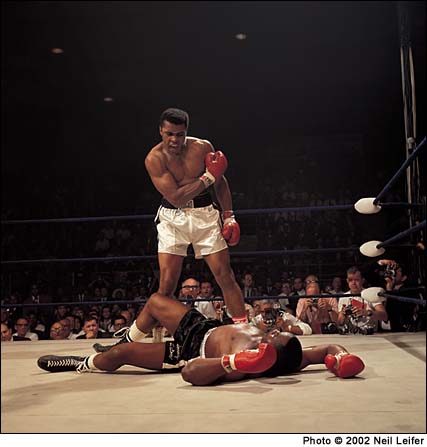Muhammad
Ali vs. Sonny Liston
St. Dominick's Arena, Lewiston, Maine, May 25, 1965
There's
no sport I enjoy photographing as much as boxing. The atmosphere
of a big-time fight--the crowd, the fashion show, all the celebrities--is
electric. When you're shooting ringside, you feel what the fighters
feel, hot under the overhead ring lights, squeezed in between
the other photographers, all of us pressed up to the apron.
When a fighter is against the ropes, you're so close that even
with a wide-angle lens, you've got to lean back to get the fighters
in frame. Over the last 42 years, I've shot almost every major
fight and every major fighter, from Sugar Ray Robinson and Floyd
Patterson, to Joe Frazier and George Foreman, to Mike Tyson
and Evander Holyfield, to Sugar Ray Leonard and Oscar de la
Hoya. Promoter Don King has been one of my best subjects; he
never met a camera he didn't love, especially mine. But my favorite
subject, no matter what the sport, was and still is Muhammad
Ali.
I
took my most famous picture on May 25, 1965, when Ali stopped
Sonny Liston with one punch in the first round of their heavyweight
championship fight in Lewiston, Maine. When Sports Illustrated
published its special issue, "The Century's Greatest Sports
Photos," my picture of Ali standing over Liston was the cover,
and I was honored and thrilled by SI's choice. "It is a great
picture of a key moment, filled with emotion and destined to
remain etched in the minds of its viewers," says Steve Fine,
SI's director of photography. "You can describe this picture
to someone, without showing it to them, and they know exactly
what you're talking about. It's a true icon of sports photojournalism."
This image represents the way people want to remember Ali: strength,
confidence and braggadocio. A two-minute fight might be a major
disappointment for the fans, but for a photographer, it doesn't
matter whether it goes 15 rounds or 15 seconds. All any editor
ever expected from me was a great knockout picture. In Lewiston,
the knockout happened exactly where I wanted it to, and my only
thought was, "Stay right there, Sonny! Please don't get up!"
Part
of being a great photographer is being lucky enough to be in
the right spot at the right time like I was, but a more important
part is not missing when you're in that spot. I got very lucky
at the Ali-Liston fight, but what I'm proudest of is that I
didn't miss. It's always assumed that the Ali-Liston picture
is my favorite. Not so--I took my all-time favorite picture
at another Ali fight one and a half years later. Photographers
had mounted cameras on the light rigging above the ring before,
only they had pointed them down, from the corners, so that they
could capture the fighters' facial expressions. Because the
lighting rig was usually only about 20 feet above the canvas,
even the widest of wide-angle lenses wouldn't allow you to capture
the whole ring. But the Ali-Cleveland Williams fight was in
the Astrodome, where for the first time, the rig would be about
80 feet up, so it wouldn't block the sightlines of spectators
in the upper deck. I realized at that height, you could get
the entire ring in the picture, and that it would be perfectly
square. Ali-Williams is my personal favorite picture, but I
know that 100 years from now, Ali-Liston is the one picture
that everybody will remember me by.

